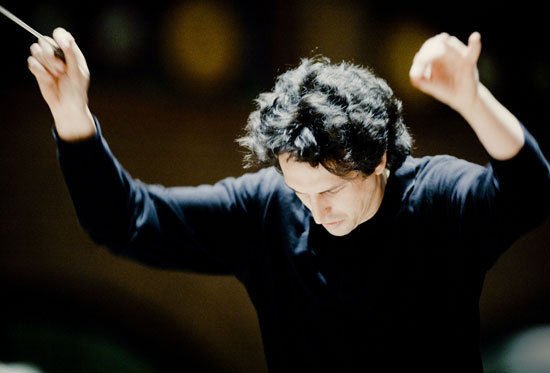Dresden Philharmonic make their debut at St George’s Hall, Bradford
October 27, 2015

Image courtesy of Bradford Theatre
Wagner’s Overture for the Mastersingers of Nuremburg begins with great grandiosity and pomp before developing into a more serene and gentle rendition of the classic opera’s theme. Conductor Michael Sanderling towers over the orchestra and uses angular, almost robotic, movements to lead his musicians, whilst his baton deals with the subtleties and nuances that he draws from each section.
In particular the strings are brought out to emphasise the romantic passion of the piece with a joyous harmony, and the formidable brass back this up with a more formal, robust rigour. The finale is a crescendo that goes back to the original theme that really hits home to seal an impressive and powerful performance.
When one considers Elgar’s Cello Concerto in E Minor you immediately think of the classic performance by Jacqueline du Pré who made the piece all her own. No pressure there then for Swansea-born cellist Thomas Carroll. Divided into four movements, the first Adagio at times uses the entire orchestra, at others paring down to allow the cello and strings to shine, and they do so radiantly and to much delight.
Like his conductor Carroll has quite an imposing stature and really gives all his physical strength to capture the ebbs and flows of the composition. The Lento – Allegro molto demands some fast-paced and intricate bow-work which is performed with precision and poise by lead and strings alike. The second Adagio becomes more contemplative and elegiac, a tone the Dresden musicians are equally adept at adopting. There is a subtle soft and shifting gentleness to the sound.
Then the final Allego, ma non troppo breaks out into a more dynamic interpretation of the original theme with Sanderling seemingly effortlessly passing this from Carroll’s trusy cello to each section of the orchestra. The feel is almost folksy and accelerates at times to quite a brisk pace with an ongoing momentum for the listener to relish in. The mood is more celebratory but without pomp or brashness, again and again focusing on the lead to take us on a magical musical journey, certainly Elgar performed at its very best.
Back to the Germanic masters for Beethoven’s Symphony No 3 in E-flat major known as the ‘Eroica’ and thought by some to be a tribute to Napoleon but certainly ‘to celebrate the memory of a great man’. The Dresden Phil are just as at home in symphonic form as they had been in the first half of the concert. Here there is more of a chance for oboe, clarinet and flute to be exalted and the allegro con brio has the theme passed around these instruments to great effect. There is a real taut tension built up in this movement which is brought to the Bradford audience with great gusto. These dynamic moments are mirrored in lighter sequences and the movement concludes with a long but entirely loveable coda.
Next up is the funeral march with some seriously sombre solemnity and dignity given to the proceedings. The symphony’s scherzo sees the Dresden players challenged once more to capture the theme’s development with the use of both pianissimo and fortissimo. Most notably the trio of hunting calls from the three horns raises the piece to a new level, ending in a formidable crescendo.
The final movement is based on what have become known as the ‘Eroica Variations’ and make this the most complex and technically difficult section. But the orchestra more than live up to the challenge with exquisite timbre and tone. Each section of the orchestra is brought to our full attention attention by the masterful Sanderling, whose contribution is as ‘heroic’ as the subject of the symphony.
A charming and utterly endearing start to the Bradford International Orchestral Concert Season, this year truncated to three due to the commencement of refurbishment, but then all the more special for it.
Reviewed by Rich Jevons at St George’s Hall, Bradford. See http://www.bradford-theatres.co.uk/venues/st-georges-hall/orchestral for full concert series details.

Comments